Interviews -
Face To Face With The Masters
Any citizen of the galaxy may be summoned to answer to the Jedi Council. Here you may read the transcripts of such sessions.
Cellblock 1138 - 1997-1999 - 2000 - 2002 - 2003+
R. A. Salvatore
December 1999, by Helen Keier
Part 3 of 4
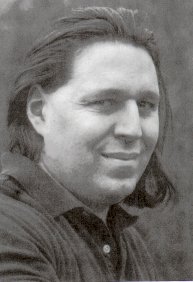
This is Part 3 of our multi-part interview with R. A. Salvatore. Click Here for Part 1 of this interview! Click Here for Part 2 of this interview!
Our own Helen Keier recently had the pleasure of meeting R. A. Salvatore
at a book signing in New York. After the meeting, she was fortunate
to be able to chat on the phone for quite a while with Salvatore. This
is the third in a multiple part interview with the author of Vector Prime. The interview below is transcribed directly from the tape of the conversation. This is probably one of the most in depth and honest interviews we've posted on the site, and we very much appreciate Helen and Salvatore for taking the time on it.
Salvatore has visited the TF.N forums and even addresses
particular concerns, praises, questions, and criticisms. Also, when
you're done here, be sure to visit
RASalvatore.com.
On with the interview!
Be warned that spoilers from the Vector Prime novel are discussed openly in this interview. If you haven't read the book, go read it, then come back here!
TFN: When we started [the interview], we talked about the idea of a shared
universe. What can you tell us about writing stories, and writing for characters that are
created by others, or where someone else will have to pick later, in a general
sense?
RAS: I don't particularly like it. At all...I would have never agreed to do it if it
wasn't Star Wars.
TFN: Why?
RAS: ...I think in a literary sense you put a character in a book and it's your
character... Nobody can get it exactly the same way, and I've known this all along. I
write my DARK ELF, and nobody else is going to write my Dark Elf the way I write my
Dark Elf....As an author, that's always been very personal to me. But again, this is Star
Wars, and it's Lucas's creation... Han Solo is George Lucas's creation but he's also
Harrison Ford's creation, which came though very clearly on the screen when watching
the movie. Actors are not robots, thankfully, and I hope we can always say this, that
they're not going to be computer animated unless we have different people animating
each one. Actors bring their own personalities to the characters. So with these
characters, I know that smirk on Han Solo's face. I've seen it. That makes it a little
easier to swallow and digest...With the three kids - that I'd never seen in a movie
obviously - they're kids, and I know kids. I know how much kids change daily, weekly,
monthly....Just knowing the basics allowed me to take them in different directions,
which was ok, because there are levels of growth people go through and I'm very
familiar with those. I have teenagers of my own.
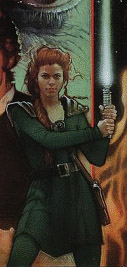 The character I was therefore most uncomfortable with and did not want in the book
because I thought I had too many protagonists, was Mara Jade. Well, that quickly
became not an option. [I was told] she will be in this book. Period . The EU
readers will go crazy if she is not in this book, so I put her in the book. But what did I
do? I gave her a life-altering condition. I knew that Mara Jade was independent, and
fiercely proud...I know what someone who has those basic character assets is like
when they are in the condition Mara Jade was in. I've seen it firsthand twice, very
recently. So I did something to make sure the character could be true to the basics that
Tim Zahn gave her, without having to worry that I was going to screw up the specifics,
because the specifics would be changed necessarily by her condition. But generally,
no, I do not like sharing characters. It's not something I try to make a habit of.
The character I was therefore most uncomfortable with and did not want in the book
because I thought I had too many protagonists, was Mara Jade. Well, that quickly
became not an option. [I was told] she will be in this book. Period . The EU
readers will go crazy if she is not in this book, so I put her in the book. But what did I
do? I gave her a life-altering condition. I knew that Mara Jade was independent, and
fiercely proud...I know what someone who has those basic character assets is like
when they are in the condition Mara Jade was in. I've seen it firsthand twice, very
recently. So I did something to make sure the character could be true to the basics that
Tim Zahn gave her, without having to worry that I was going to screw up the specifics,
because the specifics would be changed necessarily by her condition. But generally,
no, I do not like sharing characters. It's not something I try to make a habit of.
TFN: Do you feel it limits your control or freedom as an individual writer to have to
pick up a story that's created...[by] others or leave it at point where someone else can
take it in a different direction?
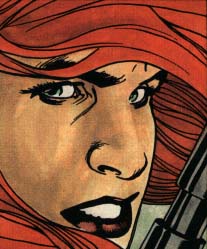 RAS: No, I don't feel that at all because I feel the writer will bring a certain
amount of creativity to every project he or she works on and that creative energy will be
channeled in many different ways. Some will be in the creation of plot...[or] original
characters. Others will be in... certain things that happen throughout the story and it's
not that, as much as I honestly I believe that characters are the most personal part of
writing...I don't think that any author can get it quite the same. Nobody can write Mara
Jade like Tim Zahn. Period. Nobody can write Mara Jade like Mike Stackpole. Nobody
can write Mara Jade like Bob Salvatore. And I'm in no way making any qualitative
judgments here. You simply can't write characters the same as the person before you
wrote them, or the person after you will write them. It's too personal, and the way you
can get around that is devices. You can have someone throwing off smart remarks all
the time. [Such as]... "I got a bad feeling about this." Oh, that's Han. ...[However] that
doesn't get to the essence of Han. That's a cliche attached to Han. It's a very big
difference.
RAS: No, I don't feel that at all because I feel the writer will bring a certain
amount of creativity to every project he or she works on and that creative energy will be
channeled in many different ways. Some will be in the creation of plot...[or] original
characters. Others will be in... certain things that happen throughout the story and it's
not that, as much as I honestly I believe that characters are the most personal part of
writing...I don't think that any author can get it quite the same. Nobody can write Mara
Jade like Tim Zahn. Period. Nobody can write Mara Jade like Mike Stackpole. Nobody
can write Mara Jade like Bob Salvatore. And I'm in no way making any qualitative
judgments here. You simply can't write characters the same as the person before you
wrote them, or the person after you will write them. It's too personal, and the way you
can get around that is devices. You can have someone throwing off smart remarks all
the time. [Such as]... "I got a bad feeling about this." Oh, that's Han. ...[However] that
doesn't get to the essence of Han. That's a cliche attached to Han. It's a very big
difference.
TFN: Do you think that working in a shared universe the whole product is
segmented, or that it's all of the different elements put together?
RAS: It's all of the different elements put together, and if you can't read a
shared universe that includes shared characters with an open mind about how each
author is going to handle those characters - unless the author does something
egregious, something completely out of character, you have to have an open mind
about everything else - if you can't do that, then you're reading the wrong books. You
should be reading standalone novels, or singular author series.
I'll give you a perfect example of this. How do you respond to the criticism if you're me?
...Someone says you've got the Luke and Mara Jade thing completely wrong, and then
the next person says "I love the way you handled Luke and Mara Jade together." How
do you reconcile that if you're the author? How do you get a feel for what's really being
said here? You got one person saying "I didn't like the Luke and Mara Jade thing.
There wasn't enough touching. There wasn't enough kissing. There wasn't enough
honeymoon stuff. They're newlyweds." ...Then you got someone else saying "I love the
way you handled that, Mara pulling back from Luke because of her condition. Shows
how strong and independent she really is." ...These diametrically opposed critiques
come rolling in, one after the other, [and] with Star Wars, [it's] more than I've ever seen.
It's like everybody wants to tell me what they liked or didn't like about the book, which is
enough to make you crazy (laughs). [What]... if someone writes a one star review?
Someone writes me a letter, and this has happened... [I received] a five page letter
telling me why this book was an utter piece of crap...Then I go to THEFORCE.NET and
read your four-star out of four-star review, and I read Scott's four-star out of four-star
review, [so] who do I believe?
TFN: To some degree, we're all correct...because it's such a subjective experience,
reading something...
RAS: Exactly. But [this is true even] if you're going to read in shared world,
especially Star Wars, which is so big, and at the same time, [while] it's a galaxy in
size...the core group of characters are always there. If you're going to read something
like that and not be open-minded about how different authors are going to treat
characters and the situations, then you're reading the wrong material...The only way
that it could not be like that would be if Del Rey had called up Tim Zahn or Mike
Stackpole or Kevin Anderson or Barbara Hambly or Aaron Allston or A.C. Crispin or
Bob Salvatore or Terry Brooks and said we want you to write all twenty-five books for
our NEW JEDI ORDER. And you know what? They would have never, ever gotten a
taker, because any author that has been doing this for that long knows that by about
book 5, they would be ready to either retire or kill themselves.
TFN: Then it's very surprising Mike has written as much of it as he has...It seems to
me as a writer and as someone who is involved in a creative enterprise, you would want
change...you would want to be doing something different.
RAS: Of course.
TFN: I know that's often said by actors, that they want to do something
different.
RAS: They have to do something different. I went back and started writing
DARK ELF books again. I had written ten, and then due to some problems between
me and TSR, I broke away from them and wasn't going to write any more DARK ELF
books, and creatively, that was fine for me, because I had taken this character through
ten novels. How many ways can you describe whirling scimitars? ...When Wizards of
the Coast bought TSR, they wanted me back, and what I needed more than money,
more than anything else, was their ok to take chances. [I wanted to] go in different
directions with some of the other characters around the Dark Elf, instead of just
featuring him,...putting him through the same kind of rubber stamp adventure...It wasn't
until I got that kind of creative agreement with them that I agreed to come back and do
Dark Elf. The new DARK ELF books do not look like the old DARK ELF books in a lot
of ways. Some of it is still there, but there are other things that are very different. Also,
the books I'm writing for Del Rey, my DEMON WARS series, are very different from any
thing I've ever done before. The writing style is the same. It has to be. That's how I
write. But the way I approach things, in terms of maturity level has changed.
TFN: You're known primarily as a fantasy writer...
RAS: That's what I am.
TFN: ...in terms of genre. How did that influence your writing within Star
Wars?
RAS: It didn't influence it at all...Again, back to the Forums - "They should
never get a fantasy writer to write Star Wars." OK, Mike [Stackpole] throw your books
away. I've heard...[Star Wars] described as space opera, I've heard it described as
science fiction. I've heard it described as fantasy. It's epic adventure, which is the
domain of fantasy more than any of the above. And I know we're getting into a time
where we're explaining the Force scientifically, with the midichlorians, and I'm not really
crazy about having the Force scientifically explained.
TFN: (Helen groans.)
RAS: There you go...I hope they're listening, because to me the Force is
magic, and to me, magic is spirituality...I think the allure of fantasy books, more than
anything else, is the fact that we have something science can't explain. We do not
have scientific formulas attached to a wizard casting a lightning bolt, or plane shifting to
another plane of existence. We do not have scientific formulas in Star Wars for
example, on making the jump to light speed...There is no scientific explanation that will
carry any weight with me to explain...why Ben Kenobi knew when Alderaan was blown
apart.
TFN: Why do you think magic, the Force, these spiritual elements, are so
important?
RAS: ...We live in a world where science can explain everything, or thinks it
can. I was thinking of writing a horror novel once, and that horror novel would be
science explaining beyond any doubt, and proving beyond any doubt, that death was
the end, that there could be no afterlife. I can't think of anything more horrible than that
as a human being. To me that is the ultimate insult, being a rational, thinking creature
that knows it's fate, physically...It makes life a big joke.
TFN: So what do you think is out there, after death?
RAS: ...I'm not going to get into what I think personally. [However]...I would
never be able to survive with a smile on my face, if I believed [and] if I was told by
scientists...if they showed me that when my brother died a month ago that was it, there
was no existence that was him anymore. I couldn't live like that. I wouldn't want to live
like that. I don't think human beings want to live like that. To me an atheist is someone
crying out for people to prove him wrong. Like that guy, The Amazing Randi, who goes
around offering a million dollars to anyone who can do something science can't explain,
the whole parapsychology thing. "If you can do something that can't be explained by
science, I'll give you a million dollars," he says. And he will. He's got the check to back
it up...He's on TV all the time saying that no one's been able to do it yet. This guy is
screaming. This guy wants nothing more than to give that million dollars away, because
when he gives that million dollars away, then he knows there might be something after
death...That's what magic does in fantasy, and that's what the Force does in Star Wars.
Science Fiction does not do that. That is not the domain of science fiction, usually...I
think [Arthur C.] Clarke [in] 2001, at the ending of that, kind of blended the whole
mystical side of science...I think right now we're trying to get to the point where science
and religion, instead of butting heads all the time, can come together in a more beautiful
co-existence. But where I grew up, the age of Apollo, science was giving very definite
answers, and many of those answers (at the time) seemed to be demeaning and
minimalizing - me...I do not believe that human beings can really be alive and happy
and hopeful and looking forward without of some element of spirituality and faith.
That's the Force of Star Wars. That's the magic in fantasy.
TFN: Wow. I'm brought back to thinking of Carl Sagan's CONTACT - I'm not
talking about the movie, but the book version - I don't know if you're familiar with it or if
you've read it...

RAS: I'm familiar with the movie. I haven't read the book. I've read COSMOS.
TFN: Even though CONTACT is a work of fiction, the main character, the Eleanor
Arroway...uses science to prove faith...
RAS: Yup. An enormously appealing idea, don't you agree?
TFN: Oh, I'm trained as a statistician...
RAS: There you go.
TFN: ...and in the novel version, she finds proof that these [statistical and]
mathematical laws hold, [such] that there is no coincidence....That's her sign of faith,
and her whole search for extraterrestrial life is her search for faith.
RAS: I think it is for a lot of people. Do you remember the astronauts...
TFN: [Yes.]
RAS: ...getting asked the question "Did you see God," in the early days of the
space program? Do you remember Ronald Reagan's comments after Challenger?
TFN: Yes.
RAS: "They touched the face of God." [It's] an incredibly human thing.
TFN: CONTACT actually is one of my very favorite books, and it's definitely
something that will always be on my bookshelf.
RAS: Sure.
TFN: How did you get your start as a writer?
RAS: ...I was a math and [computer] science major when I started college.
Christmas of 1977 my sister gave me a copy of THE HOBBIT and THE LORD OF THE
RINGS...In February of 78 we had this huge blizzard up here in New England that shut
everything down for a week and I went away on this magical journey with a Hobbit
named Bilbo to the land of Middle Earth...[I] fell in love all of a sudden with reading...I
went back and switched my major to communications media instead of math [and]
computer science. That allowed me to take many more literature courses, and for the
first time in my life, I began to appreciate literature and I learned how to truly read a
novel. I didn't really know how to read. I knew how to read the words and the
sentences, but I didn't know how to reach deeper and pull meaning out of things until I
was in college. I had some excellent professors in college that taught me how to
appreciate Joyce, Shakespeare, Chaucer, Dante, Mark Twain. But I always loved
fantasy. I got a degree as a technical writer. I got out of school and I thought I was
going to do very well. I had done really well in school, graduated summa cum laude...[I]
thought I as going to go out there and get this huge paying job, and my career would be
set. It didn't work out like that. I wound up worked in a plastics factory by day at a fairly
mindless job and working as a bouncer at night in local nightclubs. My girlfriend at the
time, now my wife...saw my frustration, and said "Why don't you write that book you
were talking about writing?" because my love of fantasy had resulted in me running out
of things to read. There weren't that many fantasy books back in the late 70's, early
80's.
...So I did. I took a short story I had written in High School, about the only thing I had
written in High School that I considered any good, and I turned it into a novel. Then I
spent 5 years perfecting that novel and going through the rejection process. When I
submitted it to TSR in 1987 they really liked it but said they could only take
FORGOTTEN REALMS books...[They] asked me to audition for the second
FORGOTTEN REALMS novel...I honestly believe it was more luck than anything else at
that point because what had happened was most of the TSR writers were in-house
people...Doug Niles had written the first FORGOTTEN REALMS novel, but all the other
in-house people were scrambling to do DRAGONLANCE novels because
DRAGONLANCE at the time was just huge, and no one knew how big FORGOTTEN
REALMS would be. I just happened to land in the slush pile at the right time, when they
needed a writer. Had I submitted my books to them two months before, they weren't
really looking for the second FORGOTTEN REALMS book. Had I sent it to them two or
three months later, when all the orders started coming in for...Doug Niles's book, I
would have been competing against their established authors, so it was a huge amount
of luck, timing, and I guess it was just fated to be.
TFN: What would you recommend, because you come from a fantasy
background...to someone who's just picked up VECTOR PRIME and wants to see what
else Bob Salvatore's got on the bookshelf? Where would you suggest they start?
 RAS: I've got five different series out there, and they're all very
different...They're all classic fantasy, but they're all somewhat different in tone from the
others. I've got a lighthearted series in the SPEARWIELDER'S TALES, a kind of a fairy
tale-ish [series]. I wrote it so I would have something to read to my kids...But really if I
had to tell someone, I would say HOMELAND which begins (with) the DARK ELF works
and the FORGOTTEN REALMS books chronologically...[HOMELAND is] one of my
favorite books, or THE DEMON AWAKENS. I think my DEMON WARS series that I'm
doing with Del Rey is [wonderful, but] right now I think I'm known for my DARK ELF
more than anything else. He's my favorite character. He's the one you go play
Everquest or Ultima or any of those online games you will undoubtedly encounter Drizzt
Do'Urden. Play Balder's Gate - he's built into the game. He's the character I'm best
known for. He's the one that's put me on the New York Times [Best seller List] several
times. The series I hope I will be known for when all is said and done is DEMON
WARS. [It is] my biggest, most ambitious [series] in scope and one I have complete
control over. So I would say either HOMELAND or THE DEMON AWAKENS.
RAS: I've got five different series out there, and they're all very
different...They're all classic fantasy, but they're all somewhat different in tone from the
others. I've got a lighthearted series in the SPEARWIELDER'S TALES, a kind of a fairy
tale-ish [series]. I wrote it so I would have something to read to my kids...But really if I
had to tell someone, I would say HOMELAND which begins (with) the DARK ELF works
and the FORGOTTEN REALMS books chronologically...[HOMELAND is] one of my
favorite books, or THE DEMON AWAKENS. I think my DEMON WARS series that I'm
doing with Del Rey is [wonderful, but] right now I think I'm known for my DARK ELF
more than anything else. He's my favorite character. He's the one you go play
Everquest or Ultima or any of those online games you will undoubtedly encounter Drizzt
Do'Urden. Play Balder's Gate - he's built into the game. He's the character I'm best
known for. He's the one that's put me on the New York Times [Best seller List] several
times. The series I hope I will be known for when all is said and done is DEMON
WARS. [It is] my biggest, most ambitious [series] in scope and one I have complete
control over. So I would say either HOMELAND or THE DEMON AWAKENS.
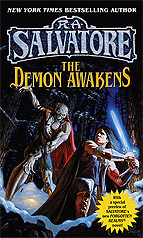
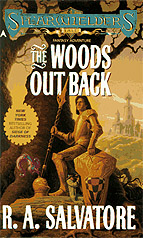
Click here for Part 1 - Part 2 - Part 3 - Part 4

